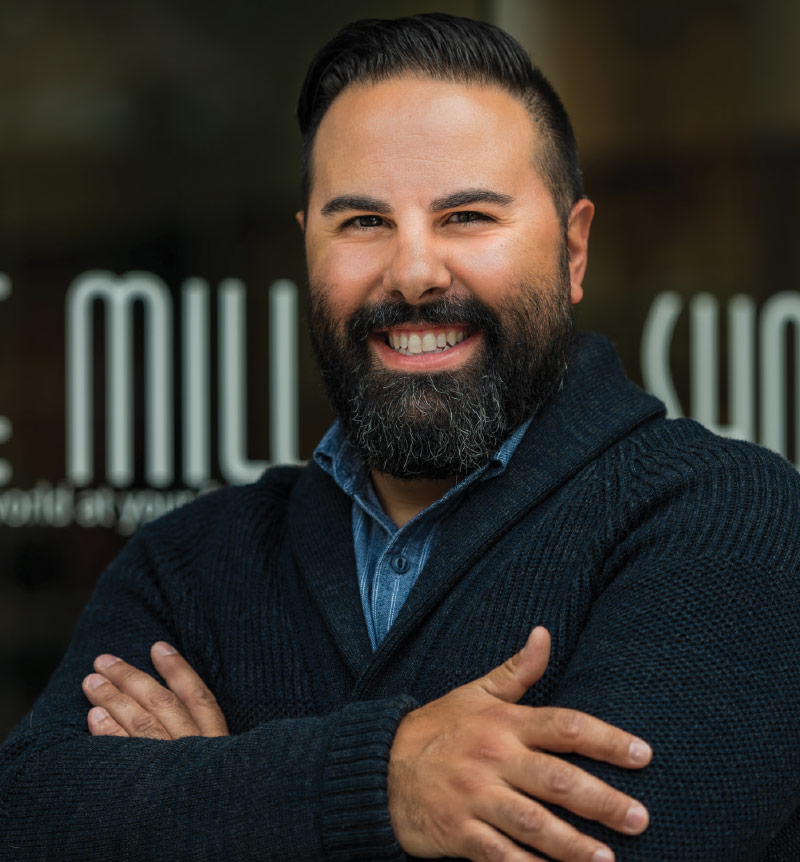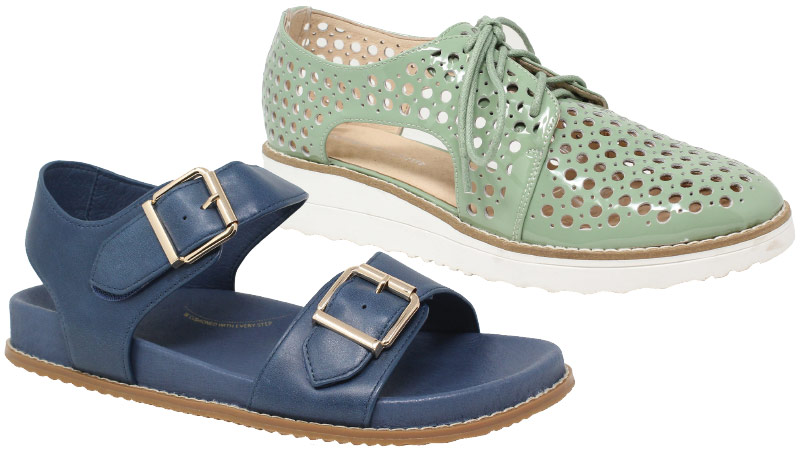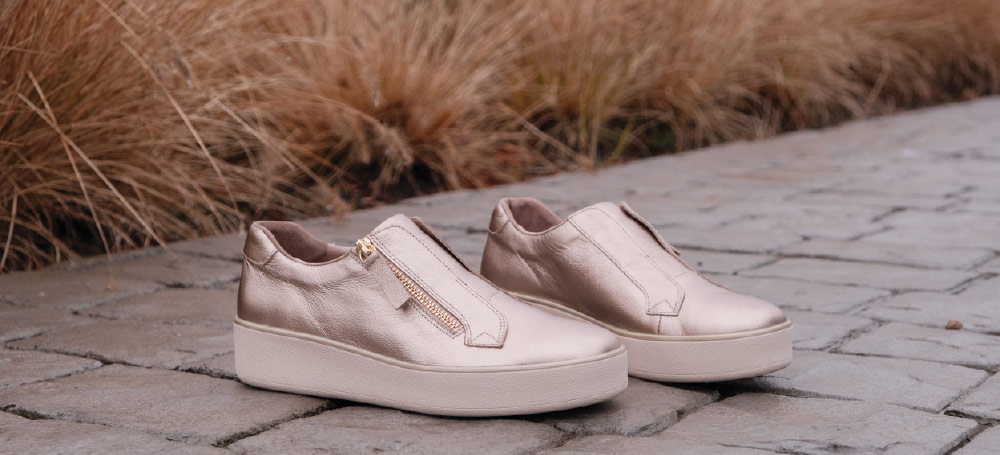 Back in sophomore year of high school, Josh Habre was pursuing his hoop dreams. There were a few caveats, however. He couldn’t jump, dribble, or shoot very well. Habre saw the handwriting on the court. Then came a job opportunity to do deliveries for his family’s four Shoe Mill stores in the Portland, OR, area. Habre essentially went retail pro, skipping college and, over the past 25-plus years, climbed the ranks by taking on nearly every job the company offered and earning every promotion along the way—working the floor, then serving as assistant store manager, manager, head buyer, general manager of all stores (14 in total), and, in 2019, president of the company and now CEO.
Back in sophomore year of high school, Josh Habre was pursuing his hoop dreams. There were a few caveats, however. He couldn’t jump, dribble, or shoot very well. Habre saw the handwriting on the court. Then came a job opportunity to do deliveries for his family’s four Shoe Mill stores in the Portland, OR, area. Habre essentially went retail pro, skipping college and, over the past 25-plus years, climbed the ranks by taking on nearly every job the company offered and earning every promotion along the way—working the floor, then serving as assistant store manager, manager, head buyer, general manager of all stores (14 in total), and, in 2019, president of the company and now CEO.
Habre’s latest role involves overseeing ERHCo’s burgeoning wholesale division, which features the Australian-based comfort brands Ziera and Django & Juliette. Habre and his brothers—Jared (president of the retail division), Joel (vice president of finance and wholesale), and Jordan (vice president of digital)—are a dream team, working seamlessly and aggressively to build upon the family’s deep industry legacy.
“My brothers and I get along great. We’d make for a terrible reality TV show,” Habre says. “When we’re facing a task, we simply ask: Does this feel heavy or light to you? Even if it’s not in one of our purviews, if it feels light, then one of us will take that task on.”
Habre, the eldest, serves as team captain. In fact, after being named president, he got the family together for a meeting because he realized that the then six-store company wasn’t big enough to support everybody in the family. He created a two-pronged growth plan to remedy the problem: First, grow the retail footprint through acquisitions and opening new stores; second, launch a wholesale division. Part one started with the February 2020 acquisition of the 100-year-old Burch’s Shoes, a two-store chain in Eugene, OR, that had no legacy plan. It was followed up with the acquisition of the four-store Footwise chain in February 2022, which has since opened a fifth Oregon location. Part two started with Ziera in late 2021 and, last year, Django & Juliette.
To date, the full court press strategy is delivering success, despite much of it being implemented in the throes of a pandemic. It hasn’t been easy learning on the fly and in the face of unprecedented disruption. But those moves—made when a lot of other companies had called timeout—created new revenue streams. The Burch’s acquisition proved particularly fortuitous because the county where the stores are located reopened much earlier than other Shoe Mill locations and provided desperately needed revenue.
Habre isn’t one to sit still or play out the clock. “I always like having options, and these moves give us diversification, for starters,” he says. “It also makes room in our family business for all of my siblings.”
He is wary of the third-generation curse associated with family-owned businesses. (Data shows that many fail when the grandkids take over.) “We didn’t want to become another statistic, and I want new challenges,” he says, adding that the wholesale opportunity is too good to pass up. “It gives us a vertically integrated supply chain and access to product at very good margins.” Then there’s Habre’s bigger picture. “I see wholesale as an opportunity to help fellow independent retailers first and then retailers in general by offering unique brands. So we’ve diversified our family business, we’re filling a void in the market, and we’re helping fellow retailers. It’s a win-win-win.”

He says the wholesale division is off to a “fantastic” start. “We keep doubling sales.” He chalks up the success to unique styling, legitimate comfort features, margin propositions initially in the 60s, and ERHCo being a seamless business partner. “Before we got into wholesale, we listed all the pain points that vendors create for us and asked ourselves, ‘How do we not do any of that?’” Habre says. For example, there are no pushy reps and there’s no competing on price. Both go against ERHCo’s core company values of being kind, positive, helpful, responsible, motivated and focusing on integrity and teamwork. “Our operating premise is to just do the right thing,” he says. “Be accessible and easy to work with across all aspects of this business.” In other words, treat retail accounts the same way the company treats its store customers. “If they’ve got a problem, let’s figure out a solution. From little things to big, we do all we can to make retailers fans of our brands,” Habre says.
It helps to have “great” partners in Munro Footwear Group. Since day one, the company has served as an excellent wholesale tutor. Having similar DNA (both companies are family run and started out in retail) is also an asset. “I couldn’t imagine better people to do business with,” Habre says. “They’re friends, mentors, and the best business partners. We’re blessed.”
ERHCo’s retail division is humming along, too. Doubling the store count in five years represents a calculated expansion strategy that doesn’t overlap Shoe Mill’s existing format or locations. For example, the company decided to keep the Burch’s and Footwise names because, “They’re well known in their communities, and we didn’t want to disrupt the marketplaces,” Habre says, noting that Burch’s is a big store concept while Footwise stores have a smaller format, are in smaller towns, and offer a merchandise mix focused on the Pacific Northwest. Think Keen, Oboz, Taos, Bogs, Hoka, and Ugg, among others. By contrast, Shoe Mill is focused on higher-end Euro comfort brands. “Our tag line is: ‘We put the world at your feet,’ and that reflects our international mix,” he says. Key brands include Birkenstock, Rieker, On, and Pikolinos, among others.
The retail division’s comp store sales are up seven percent over last year. Habre credits this gain to the department heads, who are now empowered to run the show. “Buying has enough of the right shoes at the right time, marketing is driving customers into the stores, and the sales team lives our mission of ‘creating authentic memorable experiences through personalized fit and service,’” he says.
Indeed, team ERHCo is on a roll. The brothers are spreading out the scoring opportunities like the Chicago Bulls’ once-vaunted triangle offense. While Habre may not have fulfilled his hoop dreams, he’s winning at the fast-paced and fiercely competitive game of shoe retail and wholesale. His innate talents and honed skills, along with rare leadership qualities, are leading the company to the top of the shoe game. There’s no I in this team. “There’s not a lot of ego in the room,” Habre says. “We have a system for making decisions, and it’s working. We’re all in this together.”
Why are Django & Juliette and Ziera, relatively new brands in a very crowded field, working well?
First off, we offer uniqueness and genuine comfort. Retailers are finding room for us as opposed to stocking brands that might look like more of the same. I’m a buyer above all else, and when I walk shows it’s often a case of I’ve already seen that, that, and that. Like a lot of my fellow retailers, I’m looking for uniqueness and freshness, because that’s what sells. Take 4CCCCEES and Oncept, for example. They’re unique. They’re like art on your feet. They attract attention. The three things I look for when buying are: comfortable, unique, and practical. That’s Django & Juliette and Ziera. In fact, our shoes are selling without the dopamine hit of special sales offers or in-store events. While I wish we could do more to romance our brands, they’re selling because customers either pick it up on their own or salespeople are raving about them.

How much is your retail experience an advantage in managing these brands?
It’s a double-edged sword, because I don’t have a ton of wholesale experience. So, for example, sometimes I’m too conservative in backing inventory in some areas because, as a retailer, I’m all about the turn. We’ve missed out on some sales as a result. There are also retailers who just don’t want to do business with another retailer, which is fine.
Unless competing directly, wouldn’t a retailer rather do business with someone who speaks their language?
I’d think so. To that end, we have a single door account located in the same shopping center as one of our stores, and we deliver reorders every week. We offer next-day shipments with no freight costs, and he loves it. We also stick to our MAP policy. Basically, we don’t do things that some other vendors do. Like, for example, we let them buy what they want and don’t push styles on them.
Does that retailer have access to the same selection as your stores?
Yes, and closeouts too. He also has exclusives that he can price however he wants. I truly want independent retailers to be successful. If this channel dies, this business is going to be so boring. I guess, per your earlier question of what keeps me awake at night, it’s how do we get new shoe stores to open? Right now, it costs a bare minimum of $500,000 to open a new store. There’s the lease and about $100,000 for a buildout and $300,000 in inventory that you’d love to get a three-time turn on, but that’s very unlikely. Even a two-time turn requires hitting it just right. That store likely won’t hit $1 million in sales for several years. So how do we help grow independent retail? Offering brands to retailers who are already in business that enables them to make enough profit to open additional locations is one way. Django & Juliette and Ziera do that.
Won’t more retailers mean more competition for your stores?
There’s plenty of room across the country. Independent shoe stores provide an essential and much needed service in the communities they serve. Consumers can find fixes for their foot problems, as well as discover new and exciting brands and styles The buzz in the industry of late is that many independents are losing a few big athletic brands as they take different distribution paths. Our industry needs to remember that these brands launched in independent comfort stores. In one case, run specialty wanted nothing to do with the brand at first. Pretty much every up-and-coming big brand is launched in this channel. We bring new and innovative products and brands to the market. We’re also provide jobs, and being locally owned businesses is a strong selling point to consumers. So, yes, I want and believe there should be more stores like ours across the country. If we didn’t acquire Footwise, those stores would’ve likely disappeared from those communities. People would have lost jobs. I believe we have an obligation to keep this channel alive.
What else are your offering to entice retailers to carry your brands?
A lot of sales data from Australia, which is a season ahead, our stores, and other retailers. We can say with confidence what styles work. And we’re more than happy to share that data. We’re a very transparent company, because I believe that builds trust.
Anything else?
Our shoes really fit. Retailers love these brands for that reason alone. When trying a new brand, fit is critical. If they don’t fit well, the chance of getting a customer to buy that brand again is nearly non-existent, not to mention the retailer often gets blamed just as much. Credit goes to Munro’s two lead engineers, who were trained in the UK at Clarks. They understand lasts and where straps, buttons, and elastics need to hit. They know if they need to adjust the forefoot by a couple of millimeters. They are experts in making sure all our styles fit properly. In addition, founder Carrie Munro personally tests the fit of every new shoe and will not allow it into production until it meets her rigorous standards. That’s the beauty of people who’ve spent a career on the floor never forgetting what retailers face. Also, our retail infrastructure allows us to offer higher margins than standard. Plus, we push our SRPs up a bit because we believe these brands warrant a higher price, which means better gross margin dollars, as well. Our brands make a meaningful difference when you ring the register. They are day-makers that turn. As a retailer, you want margins and turn.
How much is your wholesale success attributable to what other brands are doing wrong?
It’s definitely a factor. Some companies have been messing up of late. It’s not the product so much as it’s how they’re managing the business. Retailers are choosing not to do business with them. It goes back to our wholesale philosophy of trying to do right by retailers, which is essentially not treating them like crap. Brands like Rieker, Ara, and Josef Seibel have all been making hay of late in response to other brands’ recent management decisions.
Nike has run into similar issues of late.
The difference, though, is they’re a household name. If they flex their muscles, I think they’ll can get back on track. Their biggest issue was that they’d stopped innovating and relied too much on retro styles. They need to get back to innovating. The two brands growing most of late, Hoka and On, are technology-driven companies that look and feel different. The other lesson is don’t ever pull from retail. Nike is a fantastic case study of the perils of focusing too much on DTC.
What are your top goals for 2025?
We’re doubling down on our growth plans for retail and wholesale. If there’s a retail acquisition that makes sense, then we’ll capitalize on that. If there are new store locations to open, we’ll capitalize on that as well. Same goes for wholesale. If there’s something that we could do justice with, we will. We’re also going to deepen our partnerships with vendors who really matter to us. We kept a scorecard coming out of the pandemic, and we’ve quietly reduced our business with those who were hard to do business with and doubling down on the ones that have been great partners. Covid forced us to become better businesspeople and less emotion-driven.
What is your biggest challenge?
Finding good employees who want to work retail. It’s very tricky. People who might want to work in retail are also content doing gig work. So, we have to communicate our work schedule flexibility and not having to sit at a desk all day, like Uber offers. We also have to show, as a growing company, that there are opportunities for advancement with us. They can climb the company ladder just like I did.
What do you love most about your job?
I love that my brothers and I can do this for a living. If we’d just kept the business basically the same, we’d always have this thought in the back of our minds of taking the easy route. Instead, we’ve taken the hard path and are putting our own stamp on our family business, and I love that’s it’s working so far. My brothers and I are growing as businesspeople, as are our employees. I also love being part of an industry with a network of amazing people who, in many cases, are rooting for each other to succeed. I’ve received a lot of advice from our partners and the within the industry. This isn’t just a Josh/ERHCo show. People who I’ve made relationships with over the last 30 years have been very generous with their insights. It’s a great industry. Some of my best friends are Shoe Dogs.
I bet your grandparents would be very proud.
They just wanted one store. They were impressed how my dad and my aunt grew the business to four stores. Now we’re at 14 and counting, and we have a wholesale division. I think they’d be very proud. As the third generation, which often implodes, we’re doing our very best to avoid that. We’re trying to blow it up by becoming much bigger. •



